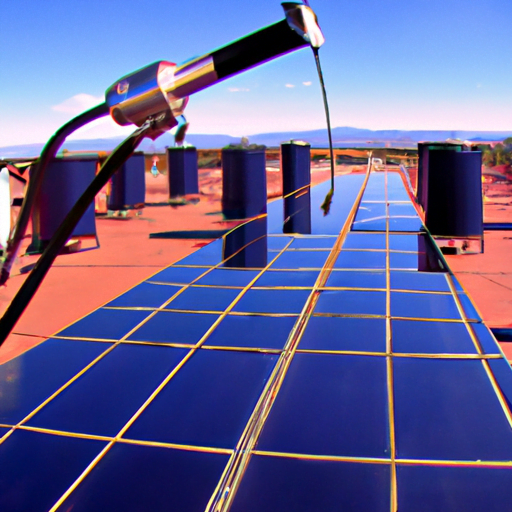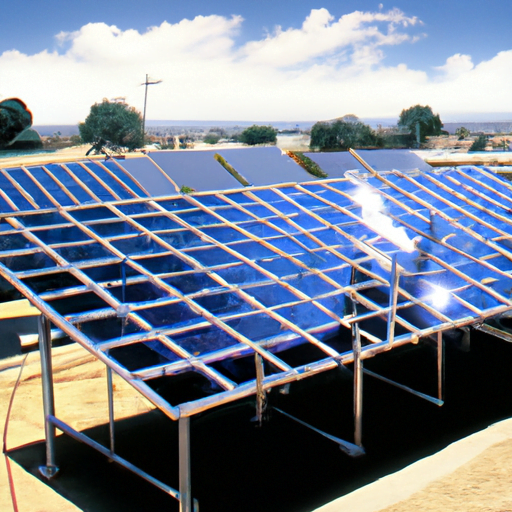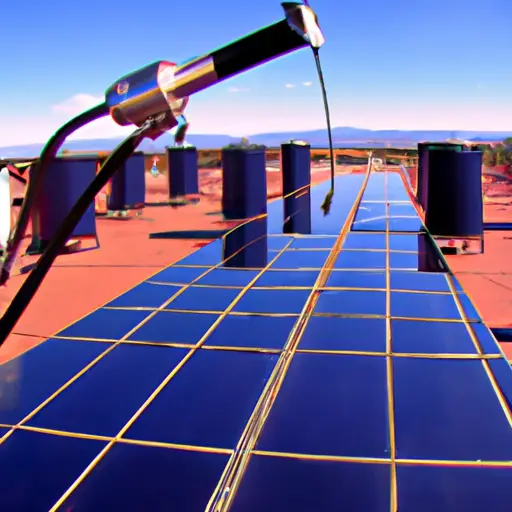So, you’ve made the decision to live off the grid and harness the power of the sun with solar panels. That’s awesome! But have you ever wondered how to keep your panels clean and functioning optimally? Well, I’m here to tell you that vinegar might just be the answer. Yes, you heard me right – vinegar!
Now, you might be thinking, “Wait, vinegar? Isn’t that just for cooking and cleaning my kitchen?” Well, it turns out that vinegar is not only a versatile household staple, but it can also be a cost-effective and eco-friendly way to clean your solar panels.
But how does vinegar actually work in cleaning solar panels? The answer lies in its acid content. Vinegar contains acetic acid, which helps dissolve and remove dirt, grime, and stubborn residue from the surface of your panels. This means that by using vinegar, you can effectively remove any buildup that might be blocking the sun’s rays from reaching your solar cells.
In our upcoming article, we’ll delve deeper into this topic and provide you with step-by-step instructions on how to properly clean your solar panels using vinegar. Trust me, it’s a simple and straightforward process that you can easily do yourself. So, if you want to maximize the efficiency of your solar panels and ensure they continue to generate clean energy, keep an eye out for our upcoming article. You won’t want to miss out on this handy cleaning solution! Cleaning solar panels regularly is essential for maintaining their efficiency and ensuring optimal performance. With the ever-increasing popularity of renewable energy sources, such as solar power, it is crucial to explore eco-friendly and cost-effective cleaning options.
One such option is vinegar, a common household cleaning solution known for its versatility and effectiveness. In this article, you will learn about the importance of clean solar panels, the properties of vinegar as a cleaning solution, the tools and equipment required for cleaning, the step-by-step process, and the benefits of regular maintenance. By the end of this article, you will understand why vinegar is a suitable cleaner for solar panels and how to use it efficiently.
The Importance of Clean Solar Panels
Maximizing Energy Efficiency Solar panels work by converting sunlight into usable electrical energy. However, when dirt, dust, or other debris accumulate on the surface of the panels, it can hinder their ability to absorb sunlight effectively. The layer of grime acts as a barrier, diminishing the amount of light that reaches the photovoltaic cells and reducing energy production.
By regularly cleaning your solar panels, you can ensure they receive maximum sunlight exposure, leading to improved energy efficiency. When solar panels are clean, they can generate more electricity, providing you with greater savings on your energy bills and decreasing your carbon footprint.
Preventing Potential Damage Dirt, dust, and other pollutants on solar panels can not only reduce energy production but also potentially damage the delicate surface of the panels. Over time, accumulated debris can cause scratches or abrasions, leading to permanent damage. This can result in a decrease in the performance and lifespan of the panels.
Regular cleaning with an appropriate cleaning solution, such as vinegar, can help prevent the buildup of dirt and grime, maintaining the longevity of your solar panels. Now that you understand why it is essential to keep your solar panels clean, let’s delve into the properties of vinegar as a cleaning solution.

Understanding Vinegar as a Cleaning Solution
Acidic Properties of Vinegar Vinegar is commonly used as a cleaning agent due to its acidic nature. As a mildly acidic solution, vinegar efficiently cuts through dirt, grease, and grime that may accumulate on the surface of solar panels. The acetic acid in vinegar helps break down the particles, making it easier to remove them during the cleaning process.
Safety and Environmental Considerations One of the advantages of using vinegar as a cleaning solution for solar panels is that it is safe and environmentally friendly. Unlike some commercially available cleaning products, vinegar does not contain harmful chemicals that can harm the environment or pose a risk to your health.
However, it is important to consider a few safety precautions when working with vinegar. Although vinegar is generally safe to use, it should not come into direct contact with your eyes or be ingested. Additionally, it is recommended to wear gloves to protect your hands from any potential irritations caused by vinegar.
Proper Tools and Equipment
Choosing the Right Cleaning Supplies When cleaning solar panels, it is crucial to use the right tools and equipment to avoid any damage to the panels. Avoid using abrasive materials, such as harsh scrub brushes or abrasive cleansers, as they may scratch or damage the surface of the panels. Instead, opt for soft brushes or squeegees specifically designed for solar panel cleaning.
Using Soft Brushes or Squeegees Soft brushes or squeegees with non-abrasive bristles are ideal for cleaning solar panels. They help gently remove dirt and grime without scratching the surface. Soft brushes with long handles are particularly helpful for cleaning panels that are difficult to reach. Squeegees can be used to effectively remove excess water or cleaning solution from the panels, leaving them streak-free.
Preparing the Cleaning Solution
Mixing Vinegar and Water To clean your solar panels effectively, you will need to prepare a cleaning solution using vinegar and water. The recommended ratio is one part vinegar to three parts water. This dilution ensures that the vinegar is effective in removing dirt and grime without being too harsh on the panels.
Recommended Dilution Ratios While a one-to-three ratio of vinegar to water is a commonly recommended dilution ratio, you can adjust the concentration based on the level of dirt or grime on your panels. For heavily soiled panels, you can increase the concentration of vinegar slightly, but be cautious not to make it too strong as it may damage the protective coating on the panels.
Cleaning Solar Panels Safely and Effectively
Working on a Cool Surface It is best to clean your solar panels on a cool day or during the early morning or late evening when they are not exposed to direct sunlight. Cleaning the panels when they are hot can cause the cleaning solution to evaporate quickly, leaving behind streaks or residue. Additionally, cold water on a hot surface can potentially cause thermal shock and damage the panels.
Avoiding Direct Sun Exposure Always exercise caution when working around solar panels, especially when cleaning them. Avoid stepping directly on the panels as this can cause irreparable damage. If necessary, use a ladder with caution and ensure that you have a sturdy footing. Working on a sunny day can make it difficult to see dirt or streaks, as the sunlight may create glare or reflection. For a thorough cleaning, it is recommended to clean the panels when they are in the shade or under cloud cover.

Step-by-Step Cleaning Process
Rinsing the Panels with Water Before applying the vinegar solution, it is important to rinse the solar panels with water to remove any loose dirt or particles. Use a hose or a bucket of water to gently rinse the panels, ensuring that the water flows freely and does not pool on the surface. This initial rinse helps loosen the dirt and prepares the panels for the vinegar solution.
Applying Vinegar Solution Once the panels are rinsed, it is time to apply the vinegar solution. Dip a soft brush or sponge into the vinegar solution and gently scrub the surface of the panels in a circular motion. Pay particular attention to areas with stubborn stains or dirt buildup. The mild acidity of vinegar helps dissolve the dirt and grime, making it easier to remove.
Gently Scrubbing with Soft Brush or Squeegee Using a soft brush or squeegee, continue to scrub the panels with the vinegar solution. Ensure that the brush or squeegee is not too abrasive to avoid scratching the surface. Work methodically across the panels, ensuring each area is thoroughly cleaned. If using a squeegee, remove excess solution and water from the panels while working to prevent streaks or spots.
Removing Stubborn Stains or Residue
Spot Cleaning with Undiluted Vinegar For particularly stubborn stains or residue, you can use undiluted vinegar directly on the affected area. Apply a small amount of vinegar to a clean cloth or sponge and gently rub the stain until it is removed. Avoid using excessive force or abrasive materials, as they may damage the protective coating on the panels.
Using Microfiber Cloths for Tough Dirt In some cases, solar panels may have tough dirt or grime that requires extra attention. Microfiber cloths are an excellent option for removing this type of dirt without scratching the panels. Dampen a microfiber cloth with the vinegar solution or plain water, and gently wipe the surface of the panels until the dirt is removed.
Regular Maintenance and Cleaning Frequency
Establishing a Cleaning Schedule To ensure the optimal performance of your solar panels, it is advisable to establish a regular cleaning schedule. The frequency of cleaning will depend on various factors, including the amount of dirt or dust in your area, the presence of trees or bird droppings, and the season. Generally, cleaning your solar panels every three to six months should suffice, but you may need to clean them more frequently in dusty or polluted environments.
Factors Affecting Cleaning Frequency Several factors can affect the frequency at which you need to clean your solar panels. These factors include the geographical location of your panels, the prevailing weather conditions, the amount of rainfall in your area, the presence of nearby trees or buildings that may cast shadows, and the level of air pollution. Regularly monitor the condition of your panels and adjust your cleaning schedule accordingly.
Monitoring and Assessing Panel Performance
Tracking Energy Output To ensure that your solar panels are functioning optimally, it is crucial to track their energy output. Compare the energy production of your solar system before and after cleaning the panels. If you notice a significant improvement in energy production after cleaning, it is a positive indication that your cleaning efforts are effective.
Spotting Signs of Panel Inefficiency In addition to monitoring energy output, you should also be vigilant for any signs of panel inefficiency. These signs may include a sudden and unexplained drop in energy production, hot spots on the panels, or visible damage to the surface. If you notice any of these signs, it is recommended to consult a professional to assess the condition of your panels.
Conclusion
Cleaning solar panels with vinegar is not only an efficient and cost-effective option but also an environmentally friendly one. By maintaining clean solar panels, you can maximize their energy efficiency, prevent potential damage, and extend their lifespan. The step-by-step cleaning process, along with regular maintenance and monitoring, ensures that your solar panels consistently provide you with optimal performance and help you contribute to a greener future. So, grab your vinegar solution, soft brush, and squeegee, and start cleaning your solar panels to experience their full potential.




